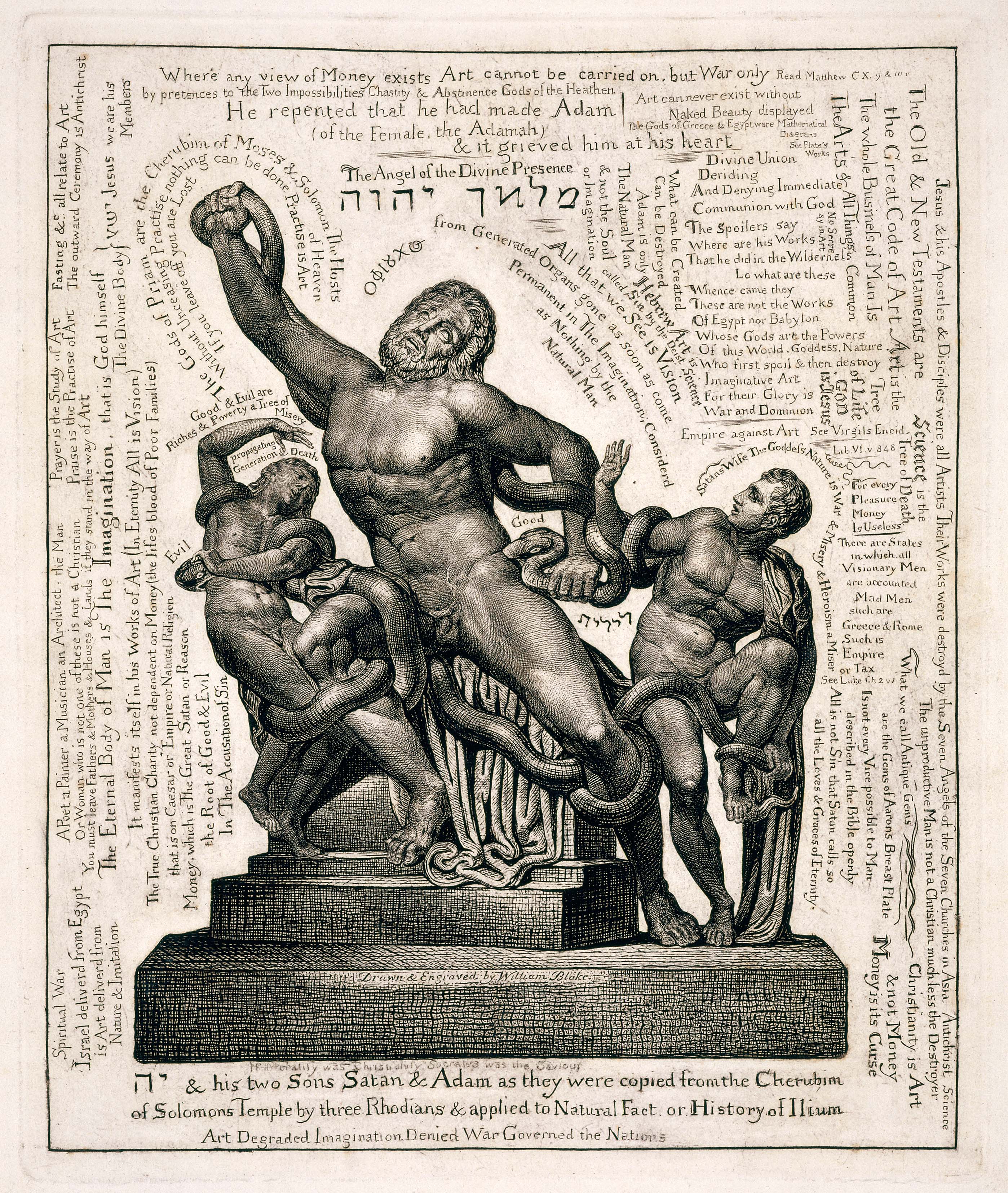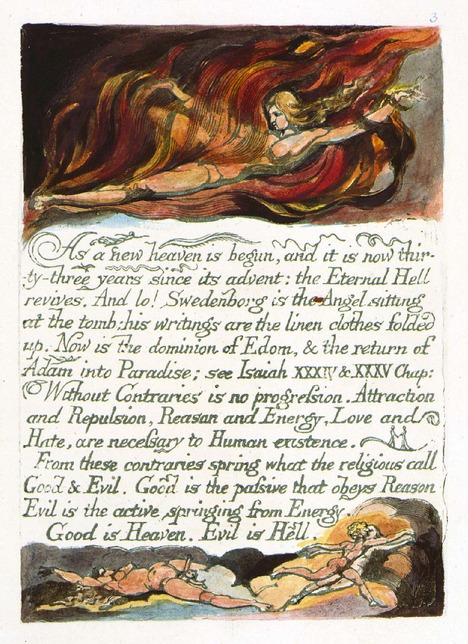 |
Laocoon Jehovah & his two Sons Satan & Adam |
William
Blake was a man who interested Henry Crabb Robinson who made a hobby of
interviewing the people who interested him. Robinson was not daunted by
the fact that Blake spoke of subjects which were beyond his
comprehension. We are indebted to Robinson for recording his first hand
conversations with Blake, something which was done by no one else.
Henry Crabb Robinson, Reminiscences, Page 26
"It is one of the subtle remarks of
Hume, on certain
religious speculations, that the tendency of them is to make
men indifferent to whatever takes place, by
destroying all ideas of good and evil. I took occasion to apply
this remark to something Blake had said. 'If so,' I said, 'there is
no use in
discipline or education, - no difference between good and evil.'
He hastily broke in upon me: 'There is no use in education . I hold
it to be wrong. It is the great sin. It is eating of the tree of the
knowledge of good and
evil. This was the fault of Plato. He knew of nothing but the
virtues
and vices, and good and evil. There is nothing in all that.
Everything is good in God's eyes.' On my putting the obvious question, 'Is there nothing absolutely evil in
what men do ?' — 'I am no judge of that. Perhaps not in God's eyes.'
He sometimes spoke as if he denied altogether the existence of
evil, and as if we had nothing to do with right and wrong ; it
being sufficient to consider all things as alike the work of God. Yet at
other times he spoke of there being error in heaven. I asked about the
moral character of Dante, in writing his 'Vision,' — was he pure ? -- '
Pure,' said
Blake, 'do you
think there is any purity in God's eyes? The angels in heaven
are no more so than we. 'He chargeth his angels with folly.'' He
afterwards represented the Supreme Being as liable to error. 'Did he
not repent him that he
had made Nineveh?' It is easier to repeat the
personal remarks of Blake than these metaphysical speculations,
so nearly allied to the most opposite systems of philosophy. Of himself,
he said he acted by command. The Spirit said to him, 'Blake, be an artist, and nothing else.' In this there is felicity. His eye glistened while he
spoke of the joy of devoting himself solely to divine art. 'Art is inspiration. When Michael Angelo, or Raphael, or Mr.
Flaxman, does any of his fine things, he does them in the Spirit.' Blake said: 'I should be sorry
if I had any earthly fame, for whatever natural glory a
man has is so much taken from his spiritual glory. I wish to do nothing for profit. I wish to live for
art. I want nothing whatever. I am quite happy.'
Among the unintelligible things he expressed was his distinction between the natural world and the spiritual. The natural world must be consumed. Incidentally, Swedenborg was referred to. Blake said: 'He was a divine teacher. He has done much good, and will do much. He has corrected many an error.'"
In Fearful Symmetry, Northrop Frey clarifies Blake's objection to Plato's objective in education.
"The
fact that in the world of vision or art we see what we want to see
implies that it is a world of fulfilled desire and unbounded freedom.
The rejection of art from Plato's Republic is an essential part
of a vision of the human soul which puts desire in bondage to reason, a
vision of a universe turning on a spindle of necessity, and an
assumption that a form is an idea rather than an image...Imagination is
energy incorporated in form...imagination
creates reality, and as desire is a part of imagination, the world we
desire is more real than the world we passively accept." (Page 26,27)
Marriage of Heaven and Hell, Plate 4, (E 34)
Laocoon, (E 273)
"Good & Evil are
Riches & Poverty a Tree of Misery
propagating Generation & Death The whole Business of Man Is The Arts & All Things Common
Christianity is Art & not Money
Money is its Curse
The Old & New Testaments are the Great Code of Art
Jesus & his Apostles & Disciples were all ArtistsAdam is only The Natural Man & not the Soul or Imagination
The Eternal Body of Man is The IMAGINATION.
God himself |
that is |<Hebrew>[Yeshua] JESUS We are his Members
The Divine Body|
It manifests itself in his Works of Art (In Eternity All is Vision)
All that we See is VISION from Generated Organs gone as soon as come
Permanent in The Imagination; considered as Nothing by the NATURAL MAN All is not Sin that Satan calls so all the Loves & Graces of Eternity." Jerusalem, Plate 9, (E 152)"And this is the manner of the Sons of Albion in their strength
They take the Two Contraries which are calld Qualities, with which
Every Substance is clothed, they name them Good & Evil
From them they make an Abstract, which is a Negation
Not only of the Substance from which it is derived
A murderer of its own Body: but also a murderer
Of every Divine Member: it is the Reasoning Power
An Abstract objecting power, that Negatives every thing
This is the Spectre of Man: the Holy Reasoning Power
And in its Holiness is closed the Abomination of Desolation"Jerusalem, Plate 74, (E 230)"the Daughters of Albion ran around admiring
His awful beauty: with Moral Virtue the fair deciever; offspring
Of Good & Evil," Jerusalem, Plate 98, (E 258)
"Where is the Covenant of Priam, the Moral Virtues of the Heathen
Where is the Tree of Good & Evil that rooted beneath the cruel heel
Of Albions Spectre the Patriarch Druid! where are all his Human Sacrifices" On Homers Poetry, (E 269) "It is the same with the Moral of a whole Poem as with the Moral Goodness
of its parts Unity & Morality, are secondary considerations &
belong to Philosophy & not to Poetry, to Exception & not to Rule,
to Accident & not to Substance. the Ancients calld it eating of
the tree of good & evil." Everlasting Gospel, (E 521)"Good & Evil are no more
Sinais trumpets cease to roar
Cease finger of God to Write
The Heavens are not clean in thy Sight
Thou art Good & thou Alone
Nor may the sinner cast one stone
To be Good only is to be
A Devil or else a Pharisee" Vision of Last Judgment,(E 554) "The Last Judgment when all those are Cast away who trouble
Religion with Questions concerning Good & Evil or Eating of the
Tree of those Knowledges or Reasonings which hinder the Vision of
God turning all into a Consuming fire <When> Imaginative Art &
Science & all Intellectual Gifts all the Gifts of the Holy Ghost
are [despisd] lookd upon as of no use & only Contention
remains to Man then the Last Judgment begins & its Vision is seen
by the [Imaginative Eye] of Every one according to the
situation he holds" Vision of Last Judgment, (E 620)"Here they are no longer talking of what is Good &
Evil or of what is Right or Wrong & puzzling themselves in Satans
[Maze] Labyrinth But are Conversing with Eternal
Realities as they Exist in the Human Imagination We are in a
World of Generation & death & this world we must cast off if we
would be Painters [P 91] Such as Rafa[e]l Mich Angelo & the
Ancient Sculptors. if we do not cast off this world we shall be
only Venetian Painters who will be cast off & Lost from Art" Vision of Last Judgment, (E 565)
" Angels are happier than Men <&
Devils> because they are not always Prying after Good & Evil in
One Another & eating the Tree of Knowledge for Satans
Gratification"Annotations to Swedenborg, (E 604)"Good & Evil are here both Good & the two contraries Married" Annotations to Bacon, (E 621)"Self Evident Truth is one Thing and Truth the result of Reasoning is another Thing Rational Truth is not the Truth of
Christ but of Pilate It is the Tree of the Knowledge of Good &
Evil" 


.jpg)


